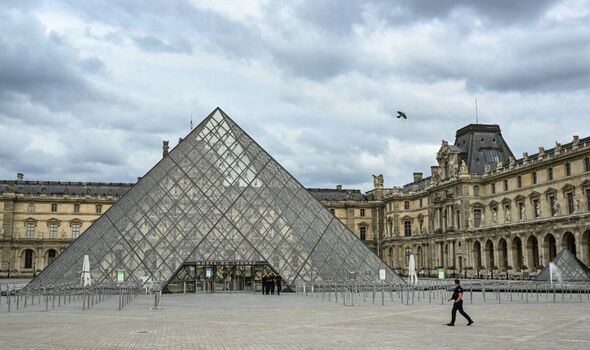$102 Million Louvre Jewelry Heist Sparks Massive Manhunt Across France
French authorities are intensifying their search for the thieves behind a daring jewelry heist at the Louvre Museum in Paris, where historical pieces valued at €88 million ($102 million) were stolen in a lightning-fast operation.
Paris prosecutor Laure Beccuau confirmed the estimated value on Tuesday, emphasizing that while the financial loss is immense, “the historical damage is incomparable.” The stolen pieces, part of France’s crown jewels dating back to the Napoleonic era, hold immense cultural and national significance.
According to investigators, the thieves used a truck-mounted ladder to access the museum’s Apollo Gallery through a window early Monday morning. Armed with an angle grinder and blowtorch, they broke into two high-security display cases, seizing several priceless artifacts.
Surveillance footage shows two men in yellow vests breaking a window at 9:34 a.m. and fleeing just four minutes later, escaping on scooters along the Seine. Officials described the heist as “precisely executed” and “professionally planned.”
Among the stolen treasures is a diamond and sapphire set once worn by Queen Marie-Amélie and Queen Hortense, including a tiara containing 24 Ceylon sapphires and 1,083 diamonds. Also missing is an emerald and diamond necklace and earrings set, a wedding gift from Napoleon Bonaparte to Marie-Louise of Austria in 1810.
Authorities said eight of the nine items taken remain missing, and recovery prospects are uncertain. Experts warn that if the jewels are dismantled or melted down, their historical value will be lost forever.
French Justice Minister Gérald Darmanin admitted that the theft revealed serious security lapses, saying, “What is certain is that we have failed. The French people all feel like they’ve been robbed.”
More than 100 investigators are currently involved in the manhunt. Police have recovered one of the getaway scooters, a helmet, and the abandoned truck used in the heist, which is being examined for DNA and fingerprints.
Art crime experts, including Christopher Marinello of Art Recovery International, warn that the stolen artifacts may already be in the hands of organized crime networks, potentially to be broken apart and sold to launder money.
The Louvre Museum remained closed on Tuesday for investigation but is expected to reopen Wednesday, except for the sealed-off Apollo Gallery, where the theft occurred.


